The Collagen-Boosting Benefits of Zinc
In a hurry? Click here to read the Article Summary...
“Zinc is a major player in the creation of DNA, growth of cells, building proteins, healing damaged tissue, and supporting a healthy immune system.” — Harvard School of Public Health
Zinc is an essential trace mineral that is vital for many functions in the body, especially in the immune system and the brain. As it turns out, zinc is also needed for collagen to work properly.
Zinc and the Immune System
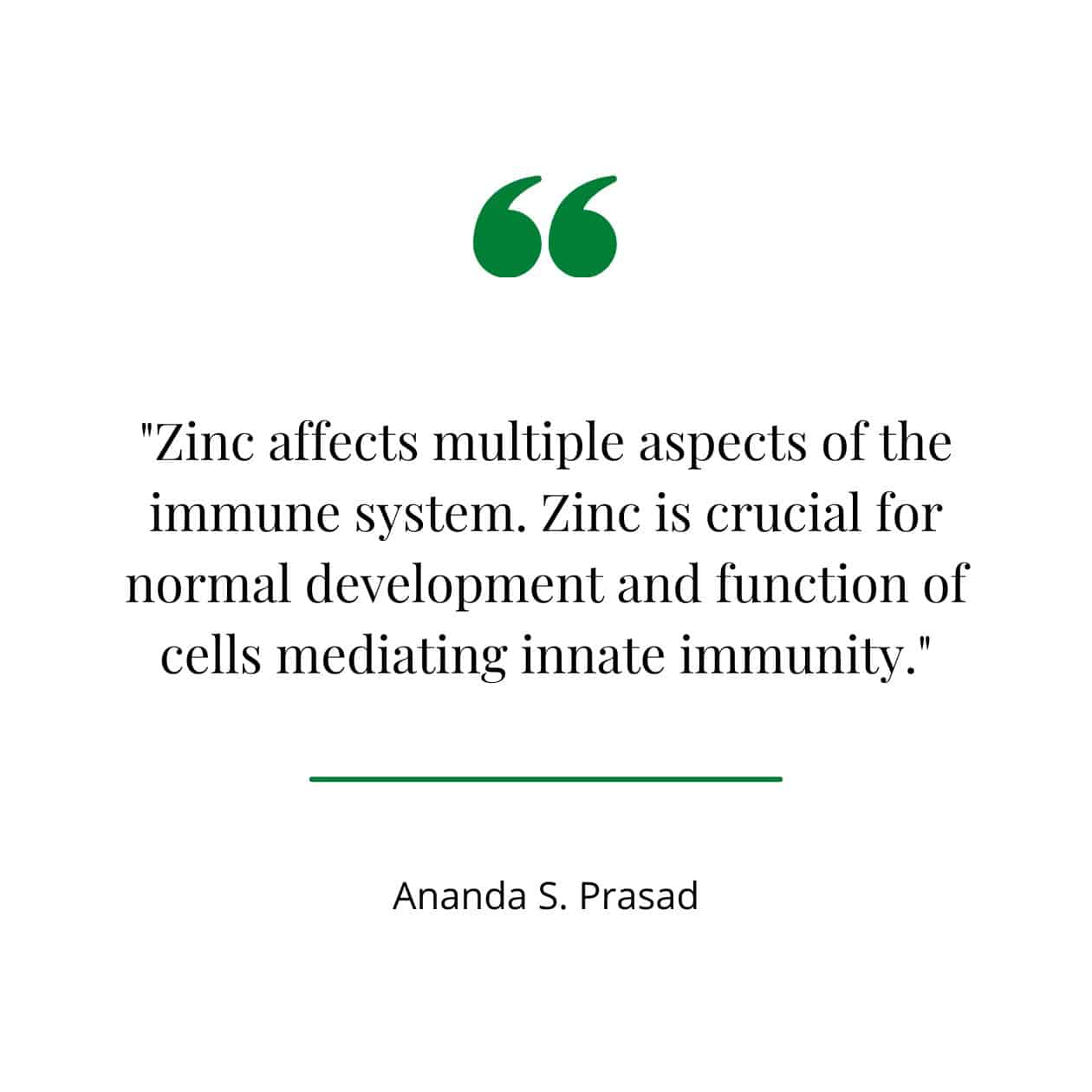
Image Source: Zinc in Human Health: Effect of Zinc on Immune Cells
Zinc is a “trace mineral,” which means it is a micronutrient that is vital for healthy function of the body. It helps to keep a type of white blood cell known as “T cells” working properly and proliferating [1], which is vital to immune function. Zinc assists in enzyme activation, cell division, heart health, and even some metabolic functions, such as balancing blood sugar.
Growing bodies need zinc. This means that pregnant women and children require sufficient zinc in their diet every day. Zinc is also important for the brain. For example, it helps maintain a healthy sense of smell and taste. Many people reach for zinc when they feel a cold coming on, and for a good reason. Zinc is such a great support to the immune system that a clinical trial conducted by Wayne State University School of Medicine and published in the American Journal of Clinical Nutrition [2] found that those who took zinc had fewer infections overall after 12 months.
Many people reach for zinc when they feel a cold coming on, and for a good reason. Zinc is such a great support to the immune system that a clinical trial conducted by Wayne State University School of Medicine and published in the American Journal of Clinical Nutrition [2] found that those who took zinc had fewer infections overall after 12 months.
This study also discovered that zinc could lower IGF-1 levels. IGF-I stands for Insulin-like Growth Factor and high levels are connected to cancer risk [3]. In the same vein, researchers involved in a 2017 study at the University of Texas at Arlington found that zinc can “significantly inhibit the proliferation of … cancer cells [4].”
Zinc Is Needed for Collagen Synthesis
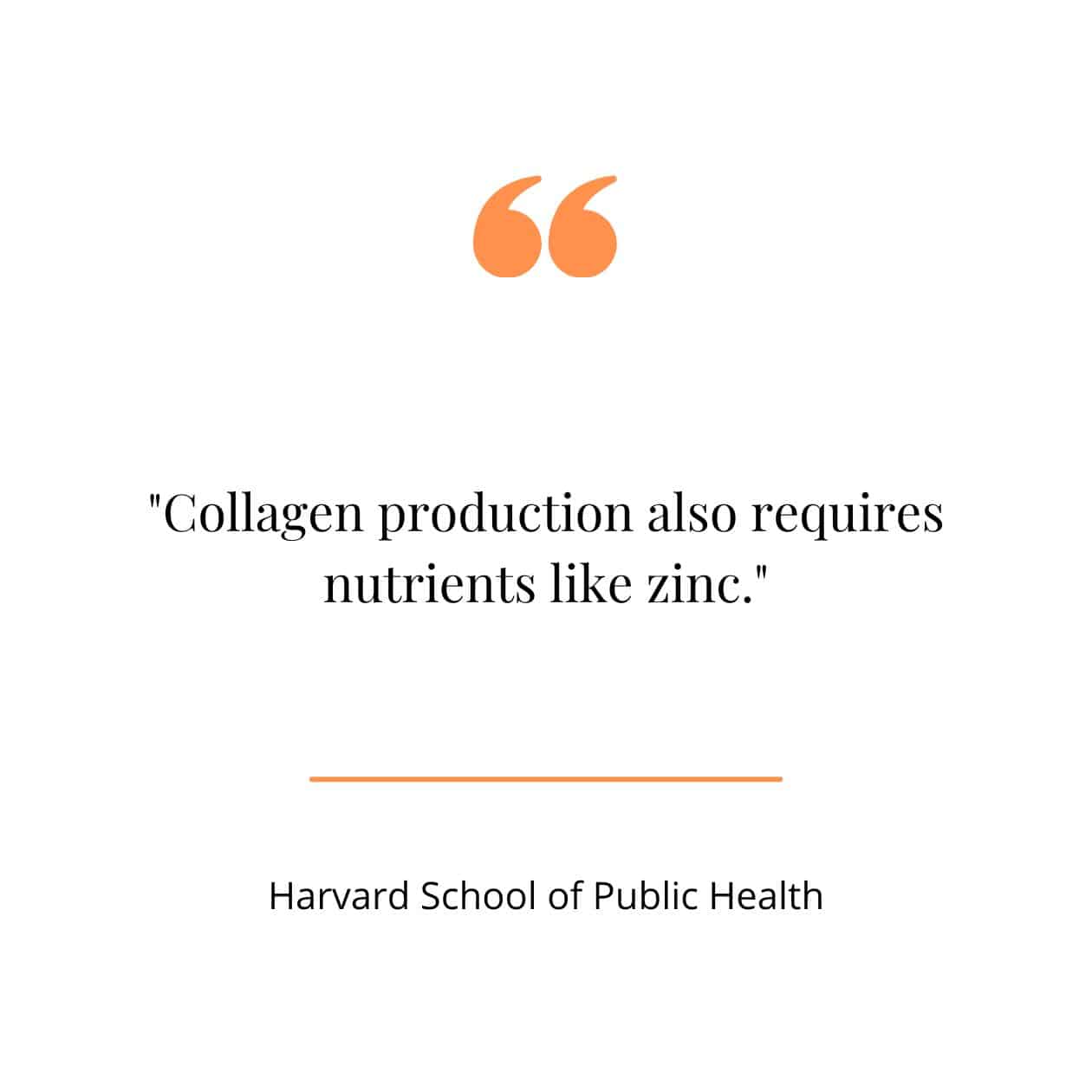
Image Source: Collagen | The Nutrition Source
With all these benefits that zinc offers the body, it’s difficult to imagine that it could possibly do more. It can, however, especially when it comes to collagen. Zinc is what is called a “co-factor” for the production of collagen. This means that its job is to “activate” certain other proteins that are vital for collagen synthesis.
If you’re not familiar with the term “collagen synthesis,” a report published in the Journal of Investigative Dermatology refers to collagen synthesis as “a complex orchestration of intracellular and extracellular events [5]” that leads to collagen production, usually aided by enzymes in the body.
Basically, without certain key micronutrients like vitamin C and zinc, collagen cannot be created. In addition, zinc has another important job. It is the activator for another protein called “collagenase [6].” This allows cells to reorganize themselves for effective wound healing.
Signs of Zinc Deficiency and How to Replenish It
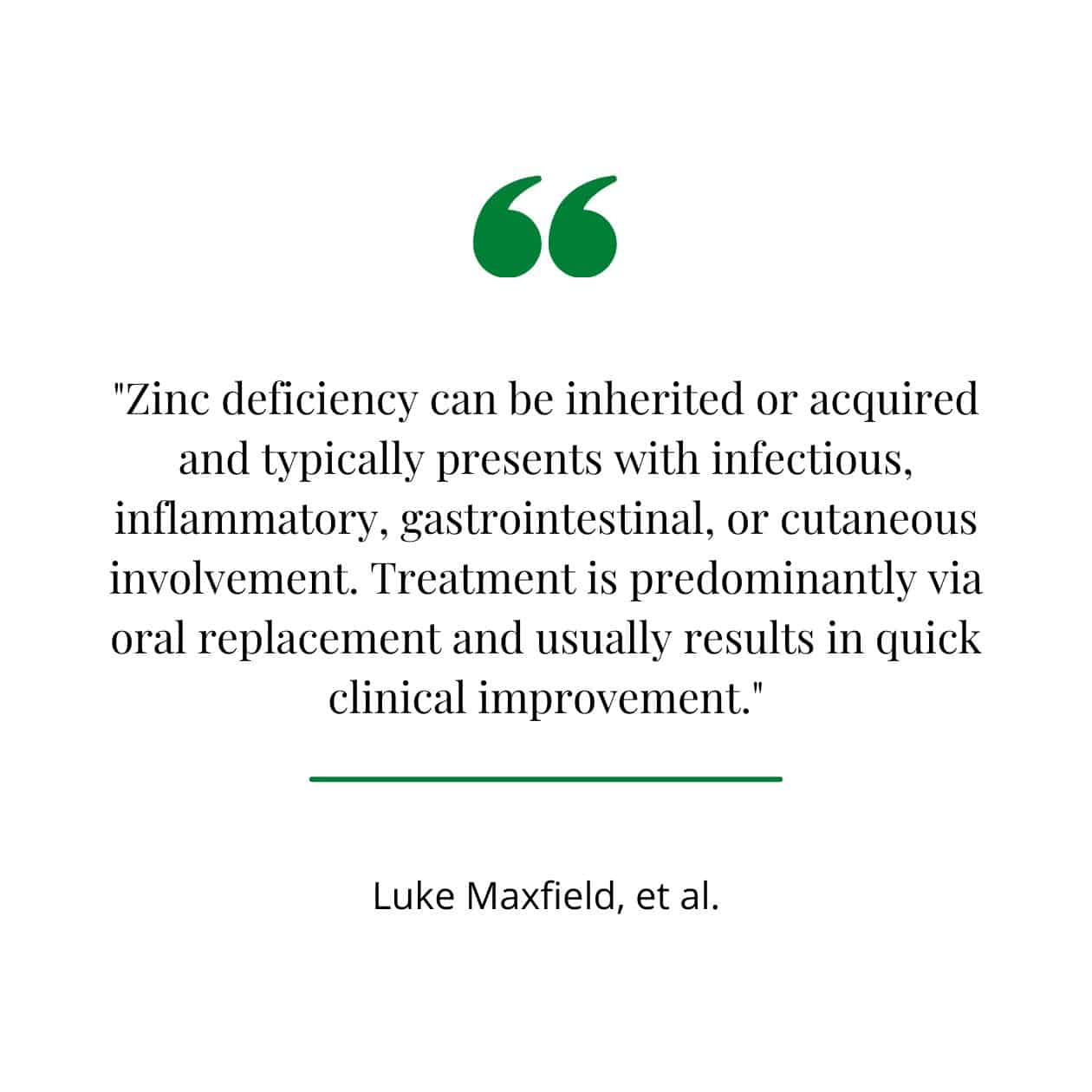
Image Source: Zinc Deficiency | National Library of Medicine
According to the National Institutes of Health (NIH), the following symptoms may be signs of a zinc deficiency [7]:
- Impaired immune function
- Loss of appetite
- Hair loss
- Chronic diarrhea
- Low libido
- Other sexual dysfunctions and reproductive system issues
- Eye and skin lesions
- Weight loss
- Slow-healing wounds
- Taste abnormalities
- Physical and mental lethargy
Also according to the NIH, those with limited caloric intake or digestive complications as well as those who drink alcohol every day are at most risk of being deficient in zinc. In addition, lack of exercise, chronic stress, and a poor diet, in general, can also play a major role in deficiency.
A 2013 Canadian study [8] found that marginal zinc deficiency may correlate to stress response dysregulation. Zinc has long been known to increase the production of BDNF (brain-derived neurotrophic factor), which you can think of as a kind of “nerve fertilizer” for the brain.
Can You Test for Zinc Deficiency?
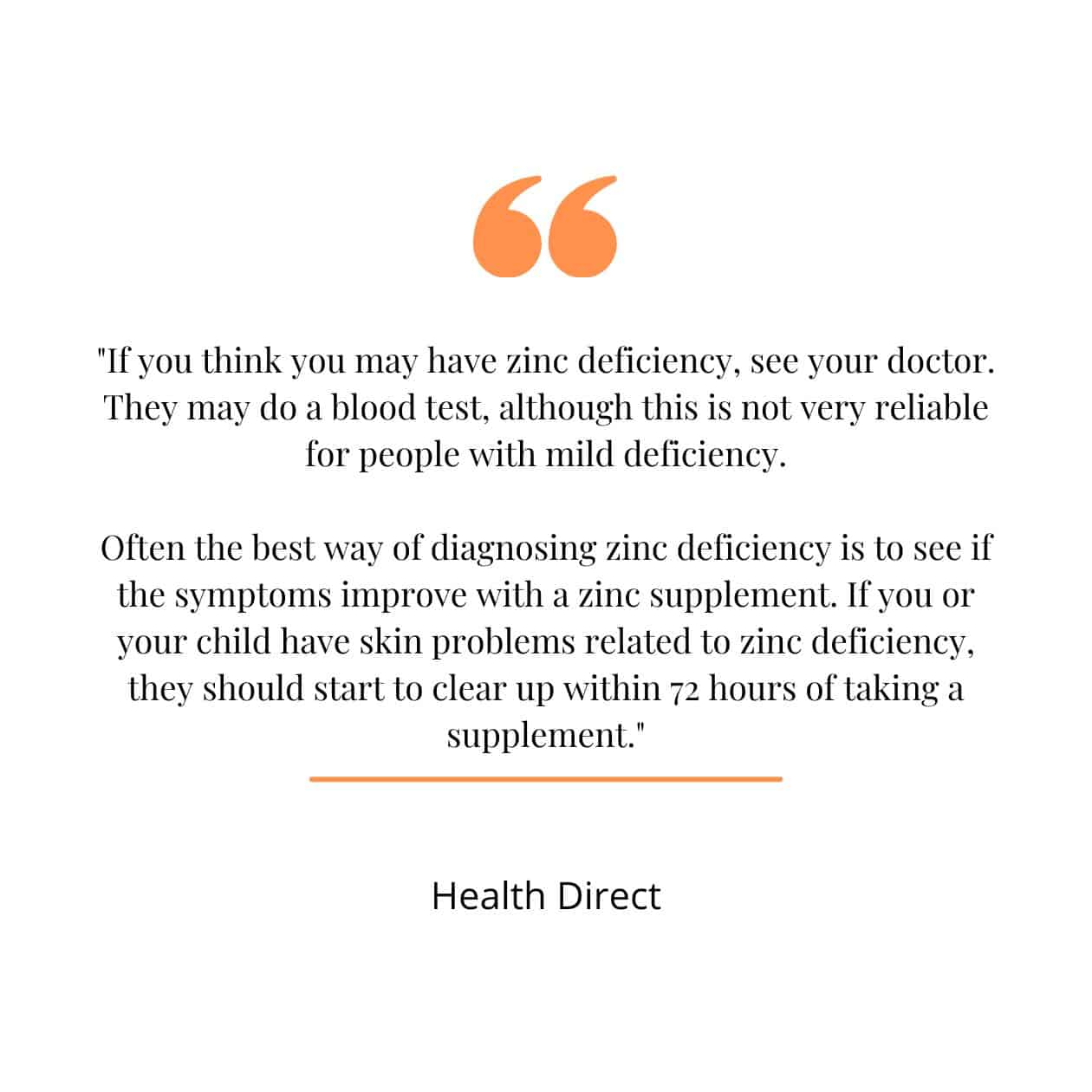
Image Source: Zinc Deficiency | Health Direct
It’s difficult to test for zinc deficiencies so often the best way is to see the signs, make changes to increase zinc in the diet through foods or supplementation, and see if symptoms improve.
The great news is that it’s easy to replenish your zinc supplies in your body by eating certain whole foods. Foods that are high in zinc include: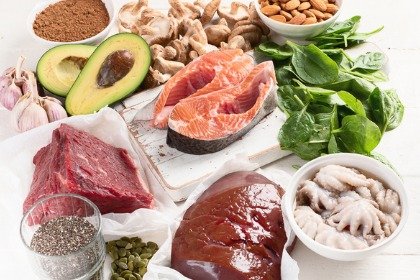
- Beans
- Nuts and like cashews, almonds, and pumpkin seeds
- Shellfish (especially oysters)
- Eggs
- Chicken
- Beef (make sure it is grass-fed and hormone-free)
- Liver
- Dark chocolate (great news for chocolate lovers!)
7 Types of Zinc Supplements
The U.S. Institute of Medicine [9] recommends 11 milligrams of zinc daily for adult men and 8 milligrams for adult women. If you feel that you still need more, zinc supplements are widely available.
There are actually seven different kinds of zinc supplements to choose from:
- Chelated Zinc
- Zinc Orotate
- Zinc Picolinate
- Zinc Gluconate
- Zinc Acetate
- Zinc Oxide
- Zinc Sulfate
Organixx Clean Sourced Collagens blend contains five types of collagen from four sources. What’s more, it’s combined with targeted nutrients such as zinc, vitamin C, and vitamin B6 which specifically enhance the bioavailability and potency of collagen. Clean Sourced Collagens is formulated from the ground up to enhance and support your body’s natural ability to heal and rebuild itself from the INSIDE out.

 Sources:
Sources:
Article Summary
Zinc is an essential trace mineral that is vital for many functions in the body, especially in the immune system and the brain. Zinc is also needed for collagen to work properly.
Without certain key micronutrients like vitamin C and zinc, collagen cannot be created.
Zinc is also the activator for another protein called “collagenase.” This allows cells to reorganize themselves for effective wound healing.
The following symptoms may be signs of a zinc deficiency:
- Impaired immune function
- Loss of appetite
- Hair loss
- Chronic diarrhea
- Low libido
- Other sexual dysfunctions and reproductive system issues
- Eye and skin lesions
- Weight loss
- Slow-healing wounds
- Taste abnormalities
- Physical and mental lethargy
The U.S. Institute of Medicine [9] recommends 11 milligrams of zinc daily for adult men and 8 milligrams for adult women.
Foods that are high in zinc include:
- Beans
- Nuts like cashews and almonds
- Shellfish (especially oysters)
- Eggs
- Chicken
- Beef (make sure it is grass-fed and hormone-free)
- Dark chocolate (great news for chocolate lovers!)
Supplementing with zinc may be especially important if you are also supplementing with collagen.


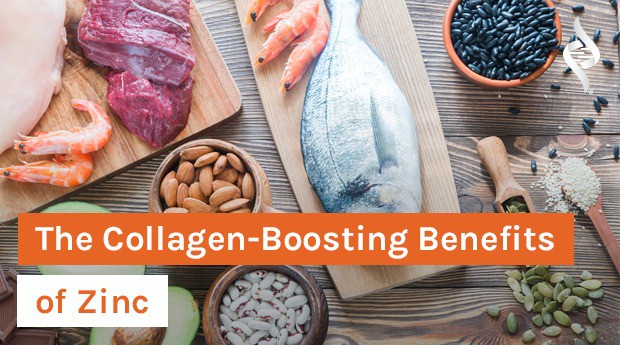


Do the different types of zinc do different things? Are there advantages to taking one type over another?
Hi Shelia, Thank you for your question. There is evidence to support that the different types of zinc do support specific bodily functions more so than others. Here is a helpful article from the NIH which we cited in our article that touches on this subject. https://ods.od.nih.gov/factsheets/Zinc-HealthProfessional/ I hope you find this information helpful. Have an awesome day! :)
Can you get TOO much zinc? I'm not talking of the Organixx Collagen, but I take other supplements that have zinc and am now getting over 100 mg of zinc per day. I have started having day long headaches; I'm wondering if it is from an excess of zinc?
Hi MIM, That is a good question. Yes, a symptom of high zinc in the body can be headaches. Please check out this article that goes over the daily recommended amounts as well as deficiency and excessive zinc symptoms. https://organixx.com/does-zinc-help-your-immune-system/ I hope you find this information helpful. Please always consult with your doctor before starting any supplement. Thank you for being here with us. Have an awesome day!
Is this product available in Canada , how can I get it
Hi Pam,
Thanks for your question.
Please know, that all of our products, including our Clean Sourced Collagens are available via our online store and we do ship internationally including to Canada.
We offer free shipping on all Canadian orders of $149.00 and above. Shipping is a flat $9.95 when minimum purchases are made.
This is indicated in the FAQ section of the product page as well as at check out. Feel free to view it here: https://shop.organixx.com/products/clean-sourced-collagens
Also, as all prices are listed in USD (US dollars), these prices do not include potential customs fees. Customs information varies per country, city, and other regional boundaries. None of the customs fees come to us here at Organixx. We always recommend contacting your local post office for more information.
We hope this helps and wish you a happy & healthy day!!
A Scientist, Who Studies Glyphosate Said It Is In Collagen -Been Found In Organic, And Non Genetic Modified Foods ???
Organixx ‘s Collagen Needs To Be Analyzed For
Glyphosate!
Thanks for your feedback, Courtenay! We truly appreciate your interest in Organixx.
We are happy to share that our Clean Sourced Collagens was tested for glyphosate by NSF International. The result was <0.01mg/kg, which means glyphosate was not detected in our product.
Here is the result of the said third-party testing, for your reference: https://organixx.com/certification/
We hope this helps and we wish you a lovely weekend!
Y’all are so awesome!
The link above takes me to Chocolate Bone Broth test results. I would like to see the one for your Collagen product.
Hi Zenith Mulkerin,
We're sorry about that. Thank you for pointing that out. You can find the 3rd party testing results via our website here: https://organixx.com/certification/
We've also updated our last response with the correct link. Thanks again. Hope you have yourself a happy & healthy day!!
Dear customer service,
Yes, I agree. Great article.
As Joy asked, what is the difference between the 7 different forms of Zinc, so that we can make an informed choice as to which form would best fit our own individual needs? That would be most helpful.
Thank you,
Carol
Hi Carol, glad you enjoyed the article. We appreciate your feedback.
You can actually find that information in the "Sources" section of the article. It's towards the end of the page, right above the article summary.
The type of Zinc that we go with and feel is the best is Zinc Gluconate. It's the one used in our very own Clean Sourced Collagens Supplement.
Zinc is an essential trace mineral that is vital for many functions in the body, especially in the immune system and the brain. Zinc is also needed for collagen to work properly. Without certain key micronutrients like vitamin C and zinc, collagen cannot be created. Zinc is also the activator for another protein called “collagenase.” This allows cells to reorganize themselves for effective wound healing.
If you would like to learn more about our Clean Sourced Collagens, we invite you to check out the following page where you will find product details, ingredient label, customer reviews, and more: https://shop.organixx.com/products/clean-sourced-collagens
Do let us know if there's anything else we can help you with.
We appreciate you being here with us and hope you have yourself a wonderful day!